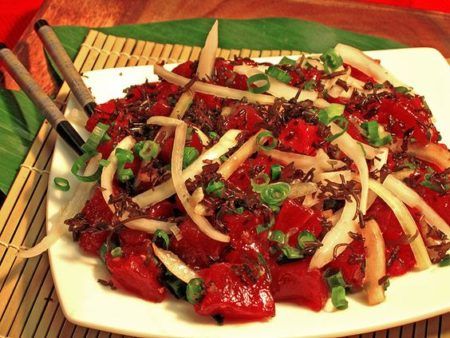Salmonella outbreak due to consumption of seaweed
 The Hawaii State Department of Health is investigating 14 cases of Salmonella infection on Oahu. The infection is linked to raw fish called limus Poke (a raw fish salad containing seaweed Limu).Seaweed is frequently served as a side dish at meals in the Pacific Islands and is a common component in the diet of many persons living in the Pacific Rim. Seaweed is often harvested at beaches, gathered in near shore waters, or purchased at local markets.
The Hawaii State Department of Health is investigating 14 cases of Salmonella infection on Oahu. The infection is linked to raw fish called limus Poke (a raw fish salad containing seaweed Limu).Seaweed is frequently served as a side dish at meals in the Pacific Islands and is a common component in the diet of many persons living in the Pacific Rim. Seaweed is often harvested at beaches, gathered in near shore waters, or purchased at local markets.
Reported cases include both children and adults. All of the cases developed diarrheal illness from mid- to late October and four have required hospitalization.
The tainted limu has been linked to a seaweed farm on Oahu which was ordered by the department to halt operations and advise its customers to remove product from sale immediately. The preliminary investigation identified the consumption of raw fish, specifically poke that contains limu, as a common element among cases.
State Epidemiologist Dr. Sarah Park said: “Although our investigation is still ongoing, our preliminary investigation has implicated limu, also known as seaweed, produced at a particular farm on Oahu,” she also said that “We found that the limu was being sourced from one farm. Moving on a hunch, while still looking at other sources of contents, we collected samples” from the farm, which tested positive for salmonella. “Whether it turns out to be different or the same (strain), it should not have come back positive,” Park said.
According to Hawaii News Now the problem seaweed came from Olokai Hawaii, a seaweed farm in Kahuku. The owner, Dr. Wenhao Sun, said tainted water used in aquaponics may be to blame. Dr. Sun says in 10 years of operations, his farm has never experienced problems like this. “We will learn more and we will find the problem,” he said. “Then we can move on so we will satisfy our customers and make sure all the food is safe.”
“If you’re going to consume limu, make sure that it is cooked appropriately,” said Park. “Do not eat it raw at this point because unfortunately, we don’t know the scope of the distribution, so we don’t know which limu is okay and which limu is not.”
This outbreak could have been prevented if the water in the seaweed farm would have been tested for pathogens.
